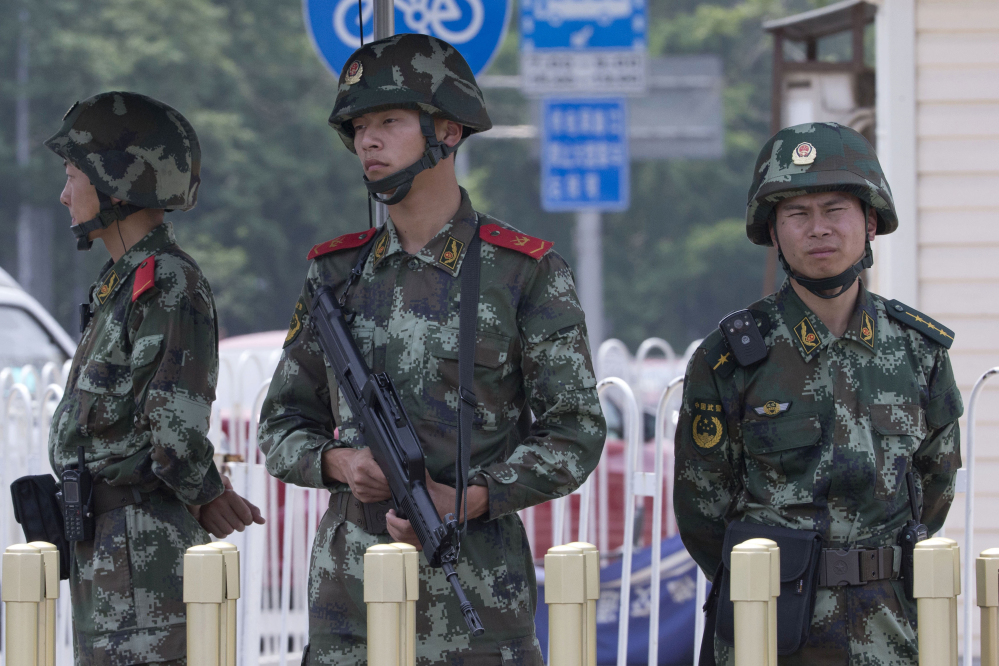BEIJING — It was a quiet day in Tiananmen Square. Even as tens of thousands gathered in Hong Kong and global headlines marked the 25th anniversary of China’s brutal crackdown on student protesters, there was no trace of remembrance at the site of their killing.
Tourists posed for pictures below the iconic portrait of Mao Zedong. Children ran laughing through the square.
The only sign of that day’s lingering effects: swarms of police patrolling the square and stationed every few hundred feet on the roads leading up to it.
For weeks, as the anniversary approached, security in Beijing grew tighter. Foreign journalists were called in and warned. Officials mobilized tens of thousands of informants to look for suspicious activity, according to state media. Authorities jailed or forced out of the city dissidents most likely to criticize the Communist government. By Wednesday, the heart of the capital was in lockdown.
The repressive tactics this year began earlier and were more extensive, a sign that the party views the historical event as an enduring threat.
In hushed interviews at the square Wednesday, some demonstrated just how effectively the party has quashed public memory of a crackdown that killed hundreds, if not thousands. Many claimed to have no remembrance of the massacre or were too afraid to respond.
“Today? What is special about today?” a tourist, 41, from Hunan province answered in response to a question. When pressed whether he had not heard about an incident in 1989, he said nervously, “Oh, you mean the student protest back then? That was today? I had forgotten all about it.”
He then quickly walked away.
Three local college students – among the few willing to acknowledge and talk openly about the massacre – said they had come to the square out of curiosity. Several police officers hovered nearby.
“Of course we know about June 4th. It’s an open secret in China,” said one of the students, standing in the same spot that 25 years earlier had been packed by a sea of protesters his age demanding political change.
But just because they knew about the 1989 massacre didn’t necessarily mean they agreed with the protesters.
“It was an irrational decision. Was it worth it to bleed and be killed for such a cause?” the student said.
Many former protesters, who witnessed those deaths, blame such reactions on the government’s propaganda, with classes and textbooks casting the 1989 protest as counter-revolutionary riot that threatened the country.
“This is why we, the survivors, must try our best to tell the next generation about our experience and help them achieve progress without sacrificing as much as we did,” said Xiang Xiaoji, 57, a former protester who now lives in New York.
In stark contrast with the silence in Beijing, more than 180,000 people in Hong Kong converged Wednesday night on Victoria Park for a candlelight vigil, according to organizers. The territory, a former British colony that returned to Chinese rule not long ago but has a separate political system and greater liberties, has been a focal point of Tiananmen commemorations.
Under Hong Kong’s looming skyscrapers, rally organizers read out the names of those who had died in the protests 25 years ago, including a 9-year-old girl. A wreath was laid beside replicas of the Monument to the People’s Heroes at Tiananmen Square and the Goddess of Democracy statue erected by protesters in 1989.
Speaking to the crowd, Teng Biao, a prominent human rights lawyer from the mainland, said that despite the many killed in Tiananmen, more have stood up for their rights in China. “You can’t kill us all,” he said.
Holding up candles, the crowd at one point repeated two chants: “Pass on this spirit from generation to generation” and “Fight to the end.”
One speaker, Lee Cheuk Yan, linked Tiananmen to Hong Kong’s struggles for democracy under Beijing rule. “The evil claw of Communist dictatorship is digging its way into our city, suppressing freedom, stepping up interference, manipulating the promised democratic elections,” he said.
In a statement, the White House called on “Chinese authorities to account for those killed, detained, or missing.”
Send questions/comments to the editors.



Comments are no longer available on this story